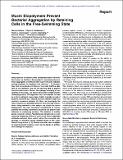Mucin Biopolymers Prevent Bacterial Aggregation by Retaining Cells in the Free-Swimming State
Author(s)
Caldara, Marina; Friedlander, Ronn Samuel; Kavanaugh, Nicole Lynn; Aizenberg, Joanna; Foster, Kevin R.; Ribbeck, Katharina; ... Show more Show less
DownloadCaldara-2012-Mucin Biopolymers Pr.pdf (553.5Kb)
PUBLISHER_POLICY
Publisher Policy
Article is made available in accordance with the publisher's policy and may be subject to US copyright law. Please refer to the publisher's site for terms of use.
Terms of use
Metadata
Show full item recordAbstract
Many species of bacteria form surface-attached communities known as biofilms. Surrounded in secreted polymers, these aggregates are difficult both to prevent and eradicate, posing problems for medicine and industry [1 and 2]. Humans play host to hundreds of trillions of microbes that live adjacent to our epithelia, and we are typically able to prevent harmful colonization. Mucus, the hydrogel overlying all wet epithelia in the body, can prevent bacterial contact with the underlying tissue. The digestive tract, for example, is lined by a firmly adherent mucus layer that is typically devoid of bacteria, followed by a second, loosely adherent layer that contains numerous bacteria [3]. Here, we investigate the role of mucus as a principle arena for host-microbe interactions. Using defined in vitro assays, we found that mucin biopolymers, the main functional constituents of mucus, promote the motility of planktonic bacteria and prevent their adhesion to underlying surfaces. The deletion of motility genes, however, allows Pseudomonas aeruginosa to overcome the dispersive effects of mucus and form suspended antibiotic-resistant flocs, which mirror the clustered morphology of immotile natural isolates found in the cystic fibrosis lung mucus [ 4 and 5]. Mucus may offer new strategies to target bacterial virulence, such as the design of antibiofilm coatings for implants.
Date issued
2012-12Department
Harvard University--MIT Division of Health Sciences and Technology; Massachusetts Institute of Technology. Department of Biological EngineeringJournal
Current Biology
Publisher
Elsevier B.V.
Citation
Caldara, Marina, Ronn S. Friedlander, Nicole L. Kavanaugh, Joanna Aizenberg, Kevin R. Foster, and Katharina Ribbeck. “Mucin Biopolymers Prevent Bacterial Aggregation by Retaining Cells in the Free-Swimming State.” Current Biology 22, no. 24 (December 2012): 2325–2330. © 2012 Elsevier Ltd.
Version: Final published version
ISSN
09609822